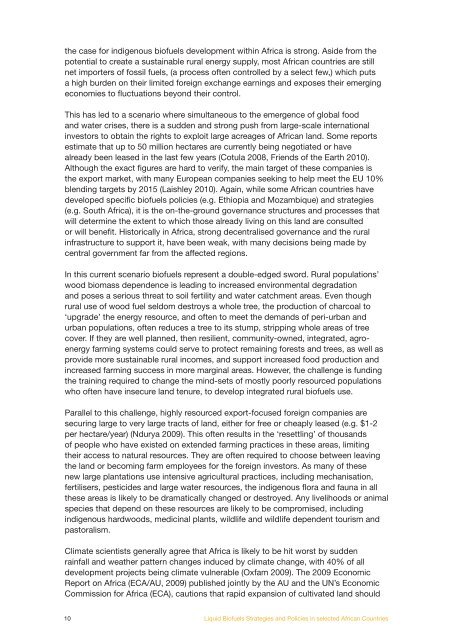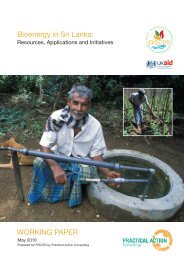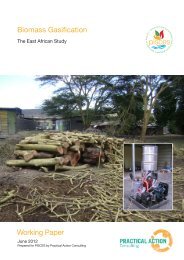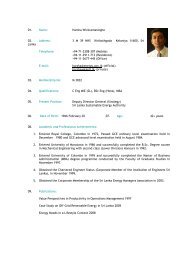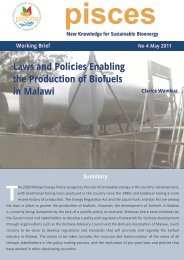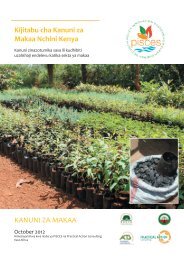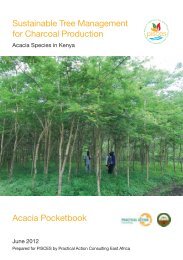Liquid Biofuels Strategies and Policies in selected African ... - Pisces
Liquid Biofuels Strategies and Policies in selected African ... - Pisces
Liquid Biofuels Strategies and Policies in selected African ... - Pisces
Create successful ePaper yourself
Turn your PDF publications into a flip-book with our unique Google optimized e-Paper software.
the case for <strong>in</strong>digenous biofuels development with<strong>in</strong> Africa is strong. Aside from thepotential to create a susta<strong>in</strong>able rural energy supply, most <strong>African</strong> countries are stillnet importers of fossil fuels, (a process often controlled by a select few,) which putsa high burden on their limited foreign exchange earn<strong>in</strong>gs <strong>and</strong> exposes their emerg<strong>in</strong>geconomies to fluctuations beyond their control.This has led to a scenario where simultaneous to the emergence of global food<strong>and</strong> water crises, there is a sudden <strong>and</strong> strong push from large-scale <strong>in</strong>ternational<strong>in</strong>vestors to obta<strong>in</strong> the rights to exploit large acreages of <strong>African</strong> l<strong>and</strong>. Some reportsestimate that up to 50 million hectares are currently be<strong>in</strong>g negotiated or havealready been leased <strong>in</strong> the last few years (Cotula 2008, Friends of the Earth 2010).Although the exact figures are hard to verify, the ma<strong>in</strong> target of these companies isthe export market, with many European companies seek<strong>in</strong>g to help meet the EU 10%blend<strong>in</strong>g targets by 2015 (Laishley 2010). Aga<strong>in</strong>, while some <strong>African</strong> countries havedeveloped specific biofuels policies (e.g. Ethiopia <strong>and</strong> Mozambique) <strong>and</strong> strategies(e.g. South Africa), it is the on-the-ground governance structures <strong>and</strong> processes thatwill determ<strong>in</strong>e the extent to which those already liv<strong>in</strong>g on this l<strong>and</strong> are consultedor will benefit. Historically <strong>in</strong> Africa, strong decentralised governance <strong>and</strong> the rural<strong>in</strong>frastructure to support it, have been weak, with many decisions be<strong>in</strong>g made bycentral government far from the affected regions.In this current scenario biofuels represent a double-edged sword. Rural populations’wood biomass dependence is lead<strong>in</strong>g to <strong>in</strong>creased environmental degradation<strong>and</strong> poses a serious threat to soil fertility <strong>and</strong> water catchment areas. Even thoughrural use of wood fuel seldom destroys a whole tree, the production of charcoal to‘upgrade’ the energy resource, <strong>and</strong> often to meet the dem<strong>and</strong>s of peri-urban <strong>and</strong>urban populations, often reduces a tree to its stump, stripp<strong>in</strong>g whole areas of treecover. If they are well planned, then resilient, community-owned, <strong>in</strong>tegrated, agroenergyfarm<strong>in</strong>g systems could serve to protect rema<strong>in</strong><strong>in</strong>g forests <strong>and</strong> trees, as well asprovide more susta<strong>in</strong>able rural <strong>in</strong>comes, <strong>and</strong> support <strong>in</strong>creased food production <strong>and</strong><strong>in</strong>creased farm<strong>in</strong>g success <strong>in</strong> more marg<strong>in</strong>al areas. However, the challenge is fund<strong>in</strong>gthe tra<strong>in</strong><strong>in</strong>g required to change the m<strong>in</strong>d-sets of mostly poorly resourced populationswho often have <strong>in</strong>secure l<strong>and</strong> tenure, to develop <strong>in</strong>tegrated rural biofuels use.Parallel to this challenge, highly resourced export-focused foreign companies aresecur<strong>in</strong>g large to very large tracts of l<strong>and</strong>, either for free or cheaply leased (e.g. $1-2per hectare/year) (Ndurya 2009). This often results <strong>in</strong> the ‘resettl<strong>in</strong>g’ of thous<strong>and</strong>sof people who have existed on extended farm<strong>in</strong>g practices <strong>in</strong> these areas, limit<strong>in</strong>gtheir access to natural resources. They are often required to choose between leav<strong>in</strong>gthe l<strong>and</strong> or becom<strong>in</strong>g farm employees for the foreign <strong>in</strong>vestors. As many of thesenew large plantations use <strong>in</strong>tensive agricultural practices, <strong>in</strong>clud<strong>in</strong>g mechanisation,fertilisers, pesticides <strong>and</strong> large water resources, the <strong>in</strong>digenous flora <strong>and</strong> fauna <strong>in</strong> allthese areas is likely to be dramatically changed or destroyed. Any livelihoods or animalspecies that depend on these resources are likely to be compromised, <strong>in</strong>clud<strong>in</strong>g<strong>in</strong>digenous hardwoods, medic<strong>in</strong>al plants, wildlife <strong>and</strong> wildlife dependent tourism <strong>and</strong>pastoralism.Climate scientists generally agree that Africa is likely to be hit worst by suddenra<strong>in</strong>fall <strong>and</strong> weather pattern changes <strong>in</strong>duced by climate change, with 40% of alldevelopment projects be<strong>in</strong>g climate vulnerable (Oxfam 2009). The 2009 EconomicReport on Africa (ECA/AU, 2009) published jo<strong>in</strong>tly by the AU <strong>and</strong> the UN’s EconomicCommission for Africa (ECA), cautions that rapid expansion of cultivated l<strong>and</strong> shouldnot be a priority, given the environmental degradation that Africa already faces. TheAU expresses concern that this new development will not <strong>in</strong>crease national agriculturalproductivity.The choices <strong>African</strong> governments are mak<strong>in</strong>g now are determ<strong>in</strong><strong>in</strong>g the futureadaptability, food <strong>and</strong> energy security, <strong>and</strong> patterns of future development of Africa.In particular, with the threat of climate change already loom<strong>in</strong>g <strong>in</strong> the form of chang<strong>in</strong>gweather <strong>and</strong> ra<strong>in</strong>fall patterns, governments need to appraise critically whether<strong>in</strong>digenous <strong>African</strong> populations will benefit or suffer from the proposed solutions, <strong>and</strong>to make decisions that are pro-poor.The key perceived benefits of biofuels as strong drivers of potential agro-energydevelopment <strong>in</strong>clude:• Decreased reliance on pollut<strong>in</strong>g fossil fuels• Increased energy <strong>in</strong>dependence• For many countries, lower fossil fuel import bills• Greater diversity of both the source <strong>and</strong> type of energy supply, especially <strong>in</strong> rural areas• F<strong>in</strong>ancial benefits for rural <strong>and</strong>/or poor communities• Jobs relat<strong>in</strong>g to energyThe potential challenges <strong>in</strong>clude:• Escalat<strong>in</strong>g competition for natural resources <strong>in</strong>clud<strong>in</strong>g l<strong>and</strong>, water <strong>and</strong> forests• Environmental damage <strong>and</strong> loss of biodiversity• Increased food <strong>in</strong>security for <strong>in</strong>digenous populations• An <strong>in</strong>creased number of <strong>in</strong>ternally displaced populations• Increased unplanned urbanisationDepend<strong>in</strong>g on how they are implemented, large-scale plantations can havemultifaceted positive <strong>and</strong> negative social <strong>and</strong> environmental impacts, which will largelydepend on the relevance <strong>and</strong> implementation of the country’s legislative context <strong>and</strong>each project’s response to:• The orig<strong>in</strong>al l<strong>and</strong> tenure• The type of l<strong>and</strong> use change• The use of local resources <strong>and</strong> ecosystems already be<strong>in</strong>g used for other commercialor livelihood purposes• The tim<strong>in</strong>g <strong>and</strong> degree of local government <strong>and</strong> community <strong>in</strong>volvement• The plantation design, execution <strong>and</strong> <strong>in</strong>tensity• The expected national or <strong>in</strong>ternational uses of, <strong>and</strong> markets for, the products <strong>and</strong>by productsThe first step <strong>in</strong> ensur<strong>in</strong>g that the development of the biofuels <strong>in</strong>dustry <strong>in</strong> each <strong>African</strong>nation is beneficial to its overall growth, richness <strong>and</strong> susta<strong>in</strong>ability is the draft<strong>in</strong>g ofpolicies <strong>and</strong> legislation that maximise the probability of success <strong>and</strong> susta<strong>in</strong>abilityacross a number of key pr<strong>in</strong>ciples.The next step is creat<strong>in</strong>g the <strong>in</strong>stitutional capacity, strength, <strong>in</strong>tegrity <strong>and</strong> frameworksto successfully implement the policies on the ground. Successful implementation ofwell thought through policy can provide <strong>in</strong>creased <strong>and</strong> more decentralised energysecurity; create numerous employment opportunities <strong>and</strong> reduce deforestation; as wellas eventually decreas<strong>in</strong>g the country’s dependence on oil imports.10 <strong>Liquid</strong> <strong>Biofuels</strong> <strong>Strategies</strong> <strong>and</strong> <strong>Policies</strong> <strong>in</strong> <strong>selected</strong> <strong>African</strong> Countries <strong>Liquid</strong> <strong>Biofuels</strong> <strong>Strategies</strong> <strong>and</strong> <strong>Policies</strong> <strong>in</strong> <strong>selected</strong> <strong>African</strong> Countries 11


